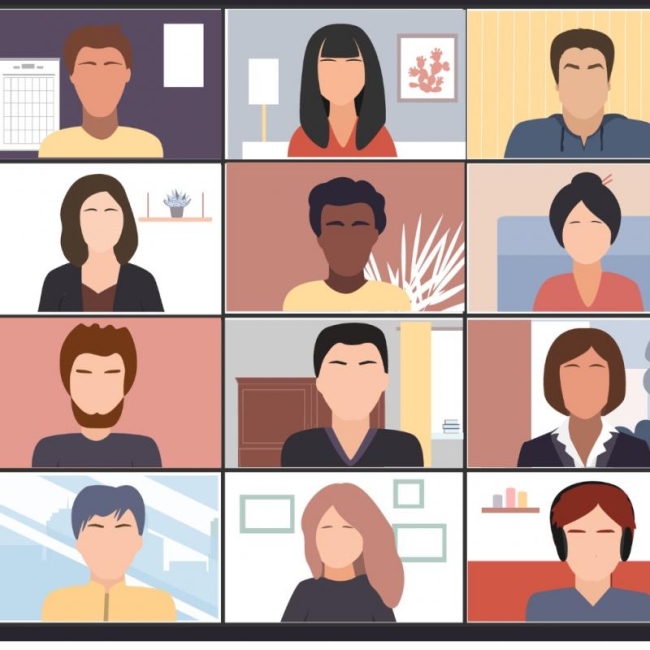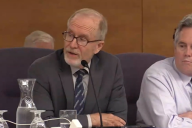You have /5 articles left.
Sign up for a free account or log in.

Istock.com/toltemara
I knew I would have a hard time with online teaching. I have no training and absolutely no experience with online teaching or online learning. I was terrified to let my students down and found myself constantly obsessing about equity, different online platforms and how to best create accessible lectures and discussions for my students. My headaches turned into migraines from too much screen staring, and I often woke up in the middle of the night thinking about how to best approach an interactive lecture for the next day.
For the first time since my rather short maternity leave, I also knew that balancing being a full-time mom to an active 3-year-old with being a full-time “precariously situated” visiting professor would take superhero physical and mental strength. I consider myself strong, but not that strong. Not to mention the never-ending anxiety of being well into the second trimester of my second pregnancy with no family around for thousands of miles and oceans to cross.
I suppose I anticipated my students needing me more than they have in the past. Truly, I also needed them just as much -- they were a welcome distraction from the fears of COVID-19 life. They needed someone from what had become their former life, an ally, but also a connection to their on-campus life to remind them that the present would not be their future. I anticipated that their mental health would suffer greatly, as would mine.
But I did not anticipate just how many hours, moments, weeks I would spend thinking up ways to help them with issues going far beyond the classroom -- of what words I could offer, what advice I could give, how I could listen and also aid. The listening part came naturally, but the words to say back to them were hard to find and select.
I am not a psychologist, but I do like to listen to people. I have even adopted active listening into my teaching, to such an extent that I run an entire class session at the beginning of each semester introducing students to what active listening is and how to activate it within our classroom space and minds. I had no idea how to proceed with these in-class models online. I was desperately seeking not to ignore the obvious: that students were forced home, some into quite difficult living situations, some to sick parents, some to worrying about the members of their families who were essential workers and constantly exposed. I was determined to not ignore that this is crazy and we are living in an actual pandemic, which has also brought even more racial and socioeconomic divisions to the forefront.
I started by giving students five to 10 minutes at the beginning of each class discussion to check in with each other and with me. Before I redirected my courses online, I sent students an anonymous questionnaire asking about certain scheduling issues, as well as asking if they wanted to participate in weekly check-ins. They unanimously said yes to the check-ins and no to synchronous lectures. Of course, they did not need to check in and divulge their personal lives, but everyone willingly took part in this, and students reported to me at the end of the semester, expressing how grateful they were to have gotten to know one another and me even without face-to-face on-campus interactions.
I recorded my lectures ahead of time and distributed them to my students, making sure everyone had access to them on their own time. We had a combination of asynchronous and synchronous discussions, and each discussion was started with a brief check-in of my own, an update -- not too divulging, but just a way to get us all to think as a community, even as we face miles between us.
My classes are generally interdisciplinary Latin American studies classes on the topics of activism and human rights in the Americas. They often deal with issues of power, equity and race. As such, these courses constantly promote the power of community organizing and concept of active listening as essential to activist practices. How would I create this feeling as we all sat behind screens so far from one another? I thought the check-ins would allow them to also become more aware of the many different backgrounds and situations my courses investigate, while also bringing them together across those background and situations. We were, for perhaps one of the first times, truly in it together. At least to an extent.
I love getting to know my students, and I often witness how the interactive way I organize my classroom around themes of empathy and active listening greatly influences their learning abilities and willingness to engage in difficult materials and assignments. However, the emotional, mental and physical toll that our students -- and, of course, we faculty members -- have experienced in the last few months is something we need to address. And we need to do so before the fall semester unwinds.
I received many panicked emails from former and current students reaching out for someone to talk to. Could I have said no? Not likely, as it would go against who I am as a person and as a professor. Students started turning not only to me, but to many of us as confidants, as mentors beyond the classroom, as individuals whom they trust and could confide their new fears in. My office hours left me feeling at a loss for what to say and what reaction to give back to students craving some sort of guidance. I listened a lot and was careful to not prescribe anything.
What do you say to a student who is graduating and fearful about their future? Or a student who wants to drop out after three years because they simply can’t keep up with their assignments? Or to a student who lost a loved one to COVID-19 and was unable to attend the funeral because there was no funeral to attend? I found myself in many of these situations and, yes, perhaps the check-ins allowed them to picture me as someone who was there to help. But I realized I need help to better understand the new role asked of me.
The online switch, combined with the rightful fear and anxiety all of our students felt, has opened a portal for seeking therapy-like consultations from many professors. The so-called invisible labor many of us have had to take on this past semester surpassed the invisible labor I had been doing for years. As far as I am concerned, these kinds of conversations that students have had with many of us in the last months are inevitable, especially as students crave campus life and nonparental guidance. Now our students turn to us to make sense of the culture of white supremacy continuing to envelop this country in light of the tragic murder of George Floyd.
If faculty and staff members are to do this for a year or two -- to live in this unknowingness and constant state of fear brought on by both a pandemic and stark racial discrimination -- we need training programs that will enable us to better help our students, especially those expressing severe mental health concerns. Several people have told me to refer those “in-need” students to a mental health counselor. That basic advice is not helpful, and it is certainly dismissive of certain student situations, especially as those students are far from their campuses. Simply referring them to the mental health service centers, should your college or university have those, is not enough in this new world we are inhabiting. Students know about these facilities and perhaps would go seek help there if they were on campus.
But in the present moment, when faculty members are the ones they interact with more than anyone from their campus life, they will certainly look to you for guidance. At least, that has been my experience. I have recently participated in many webinars, meetings, tutorials -- you name it -- learning to decipher through the many tools of online teaching. But I think we could all benefit from similar programs that teach us how to deal with the rising concerns our students bring up in office hours, online forums and through personal emails.
The structure of the classroom and the facilitation of learning has greatly shifted. Cultivating care for our students is important, especially during such a time when genuine caring for others is what is helping us all survive this pandemic and the recent inhumane treatment of black lives by police. If we are to persevere during the upcoming academic year, we need to understand how to embody those new roles -- not only as educators but also as mentors and oftentimes as individuals put in a position of being crisis counselors without any credentials.








